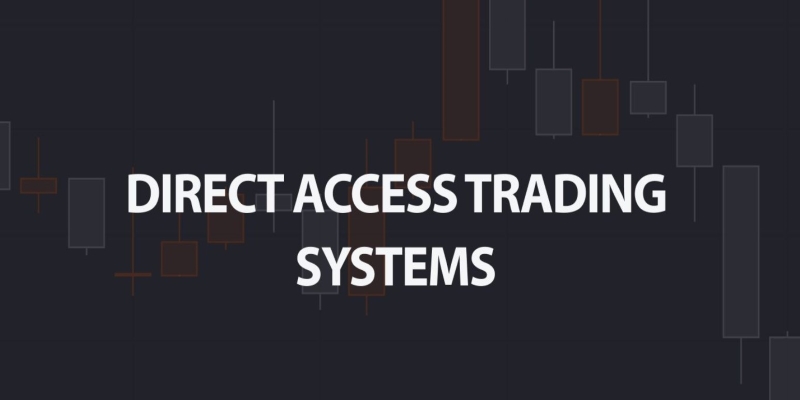Direct Access Trading (DAT): A Deep Dive into How It Works and Why It’s Popular Among Day Traders
Nov 30, 2024 By Susan Kelly
Lately, there has been much buzz among day traders and active investors about a form of trading known as Direct Access Trading or DAT. But what is DAT, and why all this fervor over DAT? Essentially, DAT represents a form of trading wherein individuals can place their trades directly to the stock exchange, thus eliminating the necessity for any third-party intermediary.

This is most often used for speed and efficacy, which means traders may make decisions that determine action in a few seconds, a very important factor in day trading. This article further breaks down what DAT entails, how it works, and why it is gaining ground in the current trading landscape.
What is Direct Access Trading (DAT)?
Direct Access Trading (DAT) is a system that allows traders to buy and sell stocks directly on the exchange, bypassing the traditional brokers who would otherwise process orders on their behalf. By using DAT systems, traders can interact with the market directly, typically through specialized electronic platforms. These platforms provide tools for fast order entry and greater control over trade execution. For active tradersespecially those engaged in high-frequency trading or day tradingthe ability to bypass intermediaries provides not only speed but also a level of flexibility that traditional brokerage models lack.

DAT systems cater primarily to those who need more than just occasional trades or investment advice. Theyre designed for people who want direct involvement in market movements, whether its to capitalize on small price shifts or to carry out complex trading strategies.
How Direct Access Trading Systems Work?
The operational dynamics of DAT systems set them apart from other trading approaches. Traditional brokerages act as middlemen, collecting orders from their clients and routing them through market makers or various exchanges. This can create delays due to processing times or the brokerages internal order management systems. In contrast, DAT systems give traders direct access to electronic communication networks (ECNs) or the stock exchanges themselves.
In practice, this means when a trader using a DAT system submits an order, its immediately sent to the market. This immediacy is critical because many DAT users are day traders or scalpers who rely on precise timing to make successful trades. Even a slight delay can make or break a trade. DAT systems enable a direct pipeline to the market, allowing orders to be executed within millisecondsan essential feature for those navigating volatile markets.
Another key feature is the detailed level of control DAT platforms provide over trade execution. Traders can choose between various ECNs or exchanges based on trading volume, prices, or specific strategies they want to employ. By doing so, they can improve their chances of executing trades at their preferred price points or in the manner that best suits their trading goals.
Why Traders Choose DAT Systems?
Direct Access Trading appeals to a specific type of trader, primarily those who trade frequently and need split-second timing. Here are some of the reasons DAT systems are attractive for active traders:

Speed and Efficiency
The most significant advantage of DAT systems is speed. When traders submit orders through a DAT platform, they are directly connected to the market, ensuring almost instantaneous execution. This speed is crucial for day traders who may only hold stocks for minutes or even seconds. In these cases, even minor delays can result in lost profit opportunities.
Greater Control Over Trades
With DAT, traders have more control over how and where their orders are placed. They can choose specific ECNs or exchanges and avoid some of the automated processes that brokers use. This granular control allows traders to be more strategic, selecting venues based on factors like liquidity and pricing. For high-volume traders, this flexibility can improve profitability by reducing spreads or fees tied to specific market routes.
Transparency and Market Depth
Data systems provide more market data, including information on price levels and trading volume across different exchanges. This data enables traders to see market depthan indication of the supply and demand for a stock at different price levels. Being able to view and act on such detailed information allows traders to make more informed decisions, whether theyre identifying trends or seeking to understand the broader market sentiment.
Lower Transaction Costs
By bypassing brokers and other intermediaries, traders using DAT systems can often avoid extra fees or commissions. Many brokers offering DAT platforms charge a flat rate per trade or even offer pricing structures based on trading volume. For high-frequency traders, these savings can add up significantly over time, making DAT an attractive option from a cost perspective.
Limitations and Risks of Using DAT Systems
While DAT systems offer many benefits, theyre not without downsides. One of the primary drawbacks is the steep learning curve associated with these platforms. They are often complex and can be overwhelming for inexperienced traders. In addition, DAT systems do not typically offer financial advice or portfolio management services, so traders need to be highly knowledgeable and self-sufficient.
Theres also the risk factor associated with the type of trading DAT systems encourage. Day trading and other high-frequency strategies are inherently risky, with the potential for significant financial losses. Additionally, DAT systems tend to have higher software and subscription costs, which can eat into profits, especially for traders who arent frequently active enough to offset these expenses with gains.
Conclusion
Direct Access Trading (DAT) systems represent a powerful tool for active traders seeking speed, control, and real-time access to the stock market. DAT systems are well-suited for those who are comfortable navigating the demands of day trading and who understand the complexities of direct market access. They provide unparalleled speed and efficiency, offering a distinct advantage in fast-paced trading environments.

Feb 26, 2024
Investment
One Buying Insurance, Whole Family Benefited
This article first introduces how an insurance can help people, and then advises people to buy insurance for themselves when they are still young and healthy.

May 16, 2024
Taxes
Introduction to Exchange-Traded Fund (ETF)
Explore the advantages and disadvantages of Exchange-Traded Funds (ETFs) in this comprehensive guide to informed investing.

Dec 01, 2024
Investment
The Role of a Designated Market Maker (DMM) on the NYSE and Its Difference from a Broker
A Designated Market Maker (DMM) plays a vital role on the NYSE by maintaining stock liquidity and stability. Explore what a DMM does, how they differ from brokers, and their impact on trading.

Dec 01, 2024
Investment
A Deep Dive into CFLEX: Revolutionizing Customized Options Trading
CFLEX is a cutting-edge platform by Cboe that simplifies customized options trading. Discover how it streamlines and secures complex options strategies in today's financial markets

Nov 05, 2023
Know-how
An Overview of the "Cost of Goods Sold" and How to Calculate It
If you're running a business, it's important to understand how to calculate the cost of goods sold. In this blog post, we will discuss what the cost of goods sold is, and how to calculate it from an income statement. We will also provide an example to help illustrate this concept.

May 15, 2024
Know-how
Finding Yearly Renewable Term (YRT) Insurance: A Layman's Overview
Curious about Yearly Renewable Term (YRT) insurance? Learn what it is, how it works, and why it might be a good fit for you in this easy-to-understand guide.

Dec 13, 2023
Know-how
Seven Key Traits of an Exceptional Accountant in Modern Business
Many qualities like staying up-to-date, being organized, and being patient make you an exceptional accountant. Read more of these traits in this article.

Feb 25, 2024
Know-how
How Do Etsy Discount Codes Generally Function?
In an Etsy store, promotional codes can offer discounts to customers before and after making a purchase. Creating discount codes is simple on Etsy, and they are a great way to encourage customers to purchase from your store. On Etsy, you can use promo codes to get a dollar amount off or a percentage off the final price of an item.

Sep 11, 2024
Investment
The Strategy Behind Tom Gardner’s Stock Picks and Motley Fool’s Triumph
The brilliance of Tom Gardner's stock picks and how his strategic approach has fueled the success of Motley Fool, guiding countless investors toward financial growth

May 11, 2024
Investment
7 Compound Interest Accounts to Grow Your Money
In this article, discover seven powerful compound interest accounts to help you steadily grow your wealth.

Nov 30, 2024
Investment
The Creation of MEMX: Why It Was Built and What It Means for Traders
Discover what MEMX is, how this innovative stock exchange works, and why it was created. Dive into the story behind MEMX and its mission to create a fairer and more transparent trading environment.

Nov 30, 2024
Investment
Exploring the Framework of Securities Market Structures: A Beginner's Guide
Dive into a simplified exploration of securities market structures. Understand how primary and secondary markets operate, the importance of exchanges, and how these elements drive investment and economic growth.